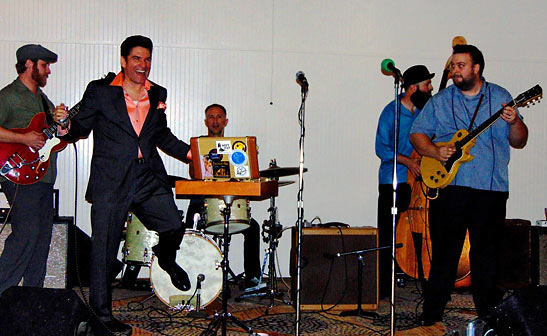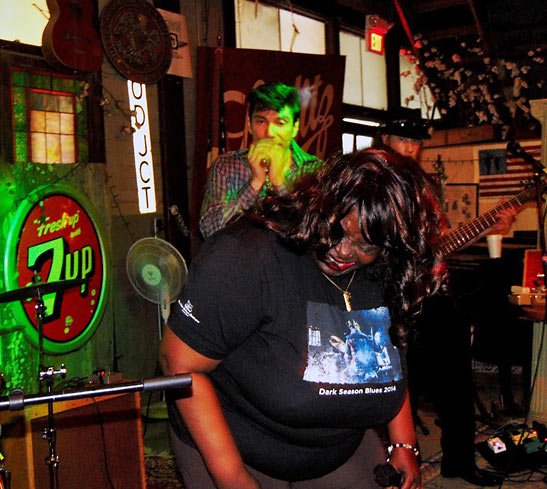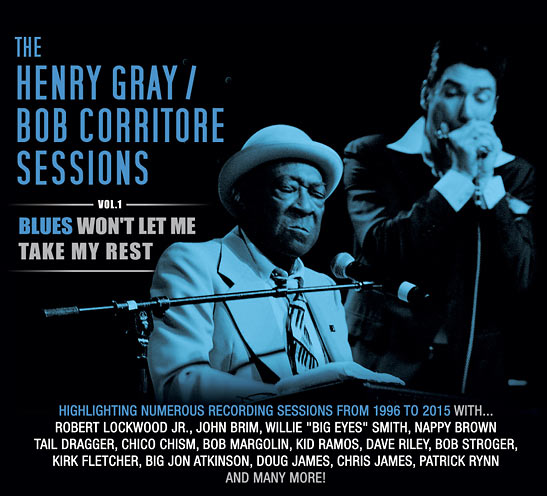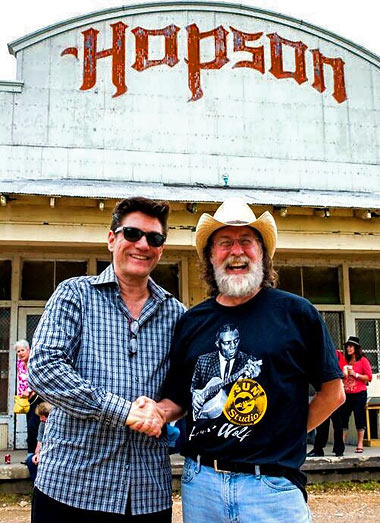 |
 |
|
 |

|
Bob
Corritore
Corritore, who turns 59 this year, also runs one of Phoenix's most popular blues venues, The Rhythm Room. His club showcases some of the world's best blues musicians, most of which just happen to be personal friends. And if that wasn't enough, the man hosts a five-hour radio program 'Those Lowdown Blues' every Sunday on KJZZ – Phoenix. Corritore is a masterful harp player who tours constantly, records regularly, writes, produces, and heads up his own band, the Rhythm Room All-Stars. There's little wonder why the Blues Foundation presented him with a 'Keeping the Blues Alive Award' in 2007... they had too! The guys a one-person AED/CPR machine who daily blows new life into an entire musical genre that he genuinely loves and probably couldn't survive without.
As fortune would have it, I briefly circled through Corritore's orbit on the Hopson Plantation, not far from the Crossroads in Clarksdale. In between stage appearances he took a few minutes to talk about his road and his blues. "I was born in Chicago and then raised on the North side, the suburbs," he says. "But once I got to the point where I could get into the bars, I was into the Chicago blues… I was in the city all the time. You couldn't get me away from those blues bars." * * * * * * * * * * * * * * * "Little Walter came on the
earth and in his 37 years he totally rewrote * * * * * * * * * * * * * * * For a person who so readily identifies with blues music… Phoenix doesn't really jump off the Blues Trail map. "Ironically, I went to Phoenix at a point," he says. "I loved Chicago and actually intended to stay in Phoenix only one year and come back to Chicago, but when I landed in Phoenix I was followed a few months later by my friend who was living in Chicago at the time, Louisiana Red. We played together and lived together for a year and that established me pretty firmly, musically in town. Then I joined another band, I started a radio show, my parents moved out to Phoenix, I have a cousin, and an uncle who moved out. Chico Chism came out in '86. I opened up the Rhythm Room in 1991 and my roots are so deep into Phoenix right now. But I get around quite a bit, I'm all over the place but Phoenix is definitely my home right now." Can you talk a little about your Chicago blues roots? "I was like twelve or thirteen and I heard Muddy Waters on the radio," Bob says. "Everything I loved about music was ALL in Muddy Waters. And I'm like, 'this is what I love' and at that moment the direction of my life changed… forever! And I bought a Muddy Waters record and fell in love with all the harmonica by Little Walter on there. My brother gave me a harmonica like a year later. And the next thing you know I'm trying to figure out the secrets of this fantastic instrument and just kept going from there. Being from Chicago, you could go see Big Walter Horton on Maxwell Street and Muddy Water's would play in my High School gymnasium and you could see Otis Rush at Barat College, and these great shows at Northwestern University. This stuff was around then."
The memories begin to flood back. "You know, the great thing about Chicago and this always kinda' freaked me out because I was this young student of the blues with this inquisitive look in his eye and asking a million questions and people would see I was seriously interested in this. The older guys just latched onto that, they just loved that kind of energy. Early on, one of my first times I ever played was on Maxwell Street with John Henry Davis and he had me up there for five or six numbers. And I'm like, 'Oh okay, I can do this.' And then, Little Mack Simmons had a show on the North side of Chicago and he invited me to play a number when I was asking him some stuff. He was there two nights. The first night I chickened out but the second... I'm ready! And he called me up and we did 'Blue Lights' together and we did a shuffle together. It was really encouraging. And Lonnie Brooks was in the band at the time, before he went out on his own, and it was pre-Alligator in the early '70s. Lonnie would invite me to come play full sets with him and cut my teeth. And Mighty Joe Young… the day that Howlin' Wolf died we went over to the Wolf's club, '1815 Club' Eddie Shaw's club and there was a big tribute to him. I played with Hubert Sumlin the day after Howlin' Wolf died." Legendary blues players were everywhere in Chicago and Bob remembers how he learned to love the blues, the environment and especially the people. "When I was eighteen we could go over to Louisa's Lounge and the Ace's would have a regular Monday jam session… with Little Walter's old band... and I was up there playing with the damn Aces!" He shakes his head. "And I'm going, 'I don't deserve this,' I really didn't. But you know, I did know how special it was and I always tried to grow into the opportunity of that. 'Cause to me the Chicago blues and the tradition is so sacred, it's so beautiful and so powerful and when I heard something that was being played, I'm like, 'how do I get to that point?' So I'd ask Carey Bell, Big Walter lesser known guys that were my friends, Big Leon Brooks, Little Willie Anderson and all these people were very open and gave me tips. We'd play together sometimes; just two harp players and I could see how the sounds were and adjust what I was doing, because the harmonica is a hard thing to teach, because everything is happening inside your mouth. It's not like you can really see, like with a guitar you can see how somebody's holding their hands. Big Leon would show me some tricks and choking the harp. Louis Myers, the great guitar player and also a great harmonica player he would show me a few things. These were the guys, you know? All the harp players would tend to be at the same shows. Big Walter would play every Sunday over at B.L.U.E.S., if the Aces were playing everybody's there. I got to meet all these great guys." He pauses briefly and looks off across the fields surrounding the Hopson Plantation before he adds. "There's this beautiful tradition I try and uphold... the music that I got to bear witness to, I got to be trained in…" When talking with harp players, hell, any blues musicians for that matter; the name Little Walter always looms large. It was no different with Bob. "Little Walter came on the earth and in his 37 years he totally rewrote the rule book on the blues harmonica. He was such a powerful, bright burning ember that he almost had to burn out early. But he left in his wake a whole changed perception of the instrument which very few people could ever speak of in those terms. When you hear those early recordings, you're hearing somebody splitting the atom. It's a whole other thing that's happening. He's breaking ground, it's fresh, it's exciting. It was swooping, it was beautiful and a whole other approach that just took it to another dimension. He was from outer space and left us with this cryptic language of blues harmonica that we are all trying to encode. And its part of everybody's playing, since him. He's the guy I listened to the most; of course I loved Big Walter, Snooky and Junior Wells and all the guys I grew up around. I love the current guys that are doing it; everybody brings to the table something cool."
Corritore says one of the few regrets from his early Chicago years was simply, "I didn't get to see Little Walter! In the '70s Little Walter had just passed so his spirit and the memories were still around, like Lester Davenport and Louis Myers, Junior Wells and Carey Bell all have great stories about Little Walter. And you felt like you kind of knew him. But Big Walter was still around playing and I got to see him hundreds of times. He played every Sunday night over at B.L.U.E.S. and we always had a great time watching him play. I was over at his house one time and I got to talk with him and asking him some things. He had this bell-like tone that was just so resonate and so full it was like none other. One time a buddy asked him, 'how do you get that tone, Big Walter?' And he said, 'It's all in the wrist!' (laughing) Having heard multiple stories about the 'larger that life' force that was Big Walter Horton, Corritore was very troubled about how the legendary harp players last days unfolded. "It's a shame, because I was around him quite a bit, and he died penniless." Bob just shakes his head. "His house was really a tenement, a high-rise in the south side of Chicago. He made his little bit of money, but he should have been a millionaire the way he played. But nobody managed him, nobody looked out after him. He lived a very rough life and ended up, I believe tossed out of the house by his step kids and basically froze to death. Any one of us would have helped him if we would have known but he was not able to call out for help. He died in a cold Chicago winter."
Bob was being waved back onto the Hopson Commissary stage for his next set, but graciously left us with his craziest bar story…"I was playing in Chicago on the west side at the Delta Fish Market, which I did frequently with a guy named Taildragger, who I still work with." He starts to smile. "Taildragger is one of the most intense blues performers, most wild guys… well, the fish market was one of those places, in the corner and they sold fish and there's a little liquor market right next to it and everybody would buy their half-pints and drink. And about 4 o'clock in the afternoon the crowd was pretty well lit. We went on stage at about 10:30 that night and it was just… pandemonium. Taildragger was just drinking like crazy, we were all just, in this wild place. So we get on stage and Taildragger's crawling on his belly, singing Howlin' Wolf's Smokestack Lightnin' and a big woman got up from the audience and got on the stage and starts grinding him on his back. (laughing) The security guards, not that they were formal security guards, were dragging her off. Taildragger gets up and falls into the drum kit. The drummer still had his snare drum, we're still playing the song and the drummer's reassembling his kit while we're doing it. We get done with that set and we're like all, 'did we just…?' Meanwhile the crowd is swaying back and forth, teetering, everybody's at the point of total intoxication, it was completely wild. I dropped a harmonica on the stage; somebody picked it up never to be seen again. It was just the wildest thing, and I don't know if I'm giving it justice because you'd have to be there. Here's this one chord Smokestack Lightnin' thing that went on for twenty minutes of pure intensity. It was so wonderful, Illinois Slim my buddy and I were playing with Taildragger on that and we still talk about it. It was one of those things where you had to be there, but it was wild." Or as Chicago blues fans refer to it… Thursday night. Related Articles: |
|
|
This site is designed and maintained by WYNK Marketing. Send all technical issues to: support@wynkmarketing.com

|




























